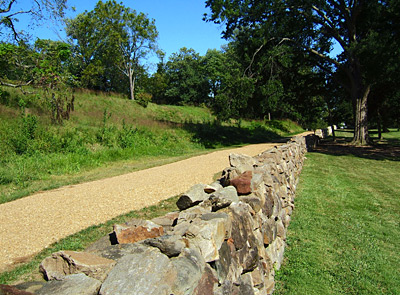 Fredericksburg's Reconstructed Stone Wall
Fredericksburg's Reconstructed Stone WallUncomfortable with having been ordered to accept overall command of the East's Army of the Potomac, its new leader began to move on Richmond. On December 13, 1862, General Burnside launched assault after bloody assault on the entrenched Confederate positions outside of the historic Virginia town of Fredericksburg. The slaughtered blanketed the cold December ground. The vast number of Union casualties appalled even some of their southern counterparts. Of the estimated 17,929 total for both sides, the Union lost about 13,353 men to the Confederates 4,576. Nine days after the battle, President Lincoln would write to his General and the men of his army.
"Executive Mansion,
Washington
December 22, 1862.
To the Army of the Potomac:
I have just read your commanding general's report of the battle of Fredericksburg. Although you were not successful, the attempt was not an error, nor the failure other than accident. The courage with which you, in an open field, maintained the contest against an intrenched foe, and the consummate skill and success with which you crossed and recrossed the river, in the face of the enemy, show that you possess all the qualities of a great army, which will yet give victory to the cause of the country and of popular government.
Condoling with the mourners for the dead, and sympathizing with the severely wounded, I congratulate you that the number of both is comparatively so small.
I tender to you, officers and soldiers, the thanks of the nation.
A. Lincoln."
About one month after accepting command of the Army of the Cumberland, General Rosecrans received a telegram from the General-In-Chief of all Union armies. It read in part, "If you remain one more week in Nashville, I cannot prevent your removal." Washington again found itself dissatisfied with a perceived lack of resolution. A few weeks later, shortly after the Union disaster at Fredericksburg, General Rosecrans would fight the bloody Battle of Stones River or Murfreesboro. This contest would see a higher percentage of casualties than any other battle during the entire war. Of the just over 80,000 men involved, almost 24,000, about one-third, were killed, wounded, or missing.
Like he had with General Burnside, President Lincoln would express his thoughts to General Rosecrans. "I can never forget, if I remember anything, that at the end of last year and the beginning of this, you gave us a hard earned victory, which had there been a defeat instead, the country scarcely could have lived over."
Sincerely,
Randy
Please visit my primary site at www.brotherswar.com
All original material Copyright © 2006. All Rights Reserved
Sources:
eHistory
American Battlefield Protection Program
NPS: Stones River Aftermath
NPS: The Battle of Stones River
Wikipedia: William Starke Rosecrans


No comments:
Post a Comment